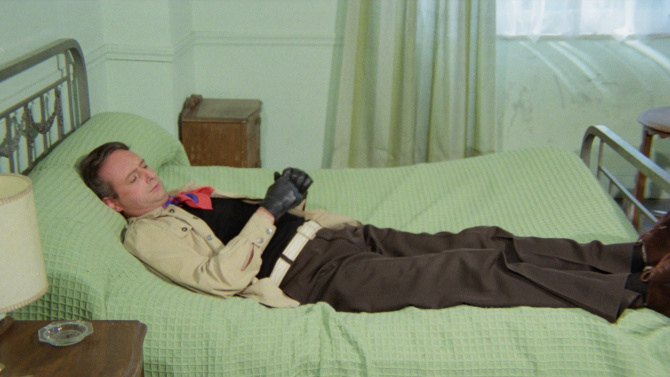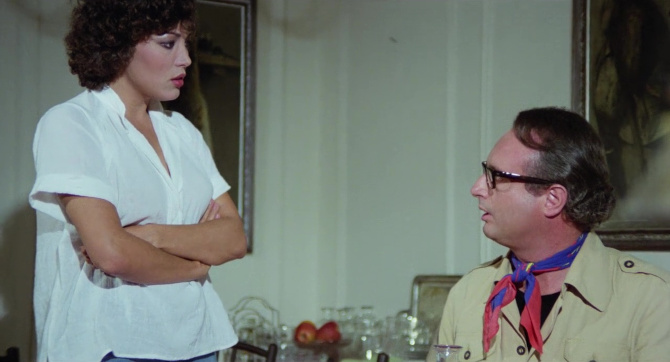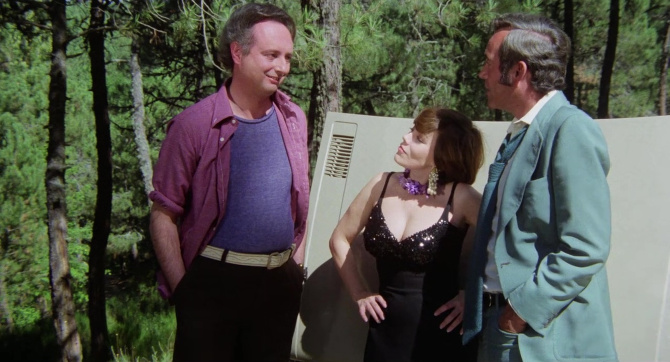A Spanish film inspired by the Italian giallo craze, 1978’s Trauma (in Spanish: Violación fatal), directed by León Klimovsky, opens in a rather fascinating way – a writer, Daniel (Heinrich Starhemberg), dressed in an overly flamboyant outfit, including an ascot (think of a pudgy, slightly nerdier middle-aged version of Fred from Scooby-Doo), drives to a secluded bed and breakfast. . . wait a minute, he’s also wearing a pair of black gloves like the killers always do in these types of movies. . . could solving the mystery be this easy, or does the ascot negate said gloves?
Finding his way down a dirt road to a most picturesque historic home (that sits beside a serenely calm lake), inside he meets Veronica (Ágata Lys), the frustrated young woman who runs the establishment. Burdened with the management of the place while also caring for her crippled husband in the attic (a man who we mysteriously never see, but can be heard when he gets into fits of rage), she finds little solace in the peaceful calm and tranquility of the locale. . . though she does enjoy spending time with her new guest (and making antique-looking figurines that she is very possessive of).
Frequent robe-wearing Daniel is his own ball of unease, having fled his wife (for unknown reasons), looking for the freedom of space, an undisturbed serenity away from the city, a soothing location to focus on his writing. And though he finds it, weird happenings begin to occur at this quaint inn. First, Victor (Antonio Mayans) and Ana (Irene Foster) arrive. . . a pair of best friends (with benefits) who are climbing the local mountain (a certain mystery revolves around the fact that we never see anything even amounting to a minor hill). By the next morning, Veronica is claiming they took off without paying the bill. . . though we know better. Soon after, another sexually adventurous couple, Gabriel (Ricardo Merino) and Eva (Isabel Pisano) – though, fact be told – they might not actually be a couple, arrive due to car trouble. . . we are told that they pay their bill (but disappear along the way). Also look for a Young Boy (Tony García Jr.) who keeps popping up for unknown reasons. And, while we’re at it, Daniel’s wife, Elena (Sandra Alberti), will finally track her husband down – bringing all of the pieces together for the finale.
A film beholden to all of the gialli that came before it (as in 1978, this is considered a very late addition to the genre), as well as Alfred Hitchcock’s Psycho (after seeing it, you will be able to draw the comparisons yourself – a little teaser: a bathtub/shower does come into play), it might not be overly difficult to predict the final results (especially if you are a frequent viewer of such films), but it is the little tweaks along the way that make it all the more memorable. There is an undeniable tragedy to the piece – Veronica trapped in a lifeless (and thankless) world that equates to her own personal purgatory (she does not seem satisfied in any which way), while Daniel similarly oozes a melancholic vibe of unhappiness. Interestingly, we could assume that this might be due to the fact that his marriage is in shambles (or his wife is a dark and maniacal femme fatale), but when she arrives, she challenges our preconceived notions – for she ends up being the very opposite. Another noteworthy observation – take a deeper look at the Daniel character (for perhaps he might just be closeting a secret deep inside – a fascinating possible perspective).
The other major player in this piece is its setting. Though not as flashy as the historic city streets and modern amenities found in the usual metropolitan set giallo, there is something truly mesmerizing about this setting. A thick and lush forest for miles around, a lake that never seems to have much life, an unknown mountain that is never seen, all of these things make it seem like this bed and breakfast is stranded in the undiscoverable middle (with a faulty phone line not helping matters). Inside is its own conundrum, for nearly the entire house is finished with ornate wood paneling, including every door – making it somewhat akin to a mirrored fun house (we’re never quite sure which room is which, or what might be hiding behind the wood paneling).
A little known giallo-style thriller (that lingers rather closely to the slasher horror sub-genre that would soon be exploding in the United States), Trauma is an aptly named film that deserves to be seen. Enjoying the lax laws that came with the death of Francisco Franco, Klimovsky pushes the envelope (with plenty of nudity and violence to draw its audience in), while showing his directing skills that he built during a lifetime (at 71 years old, this would be the last year of his film making career – though he lived to the ripe old age of 89). Look for the camera being its own character (it lingers a bit longer than would be expected), along with zooms, and some other rather unique movements. So, don’t split on this unusual entry, it’s got the grit and personality to succeed.
This film is in Spanish with English subtitles



